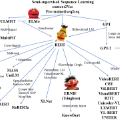Language embeds information about social, cultural, and political values people hold. Prior work has explored social and potentially harmful biases encoded in Pre-Trained Language models (PTLMs). However, there has been no systematic study investigating how values embedded in these models vary across cultures. In this paper, we introduce probes to study which values across cultures are embedded in these models, and whether they align with existing theories and cross-cultural value surveys. We find that PTLMs capture differences in values across cultures, but those only weakly align with established value surveys. We discuss implications of using mis-aligned models in cross-cultural settings, as well as ways of aligning PTLMs with value surveys.
翻译:语言蕴含了人们持有的社会、文化和政治价值观。以往的研究已经探讨了预训练语言模型(PTLMs)中编码的社会和潜在的有害偏见。然而,还没有系统研究探究这些模型中嵌入的不同文化背景下的价值观。在本文中,我们引入探针研究模型中嵌入的各种文化中的价值观,并检查其是否与现有的理论和跨文化价值观测量工具相符。我们发现,PTLMs 捕捉到了不同文化背景下的价值观差异,但这些差异与已有的价值观测量工具只有微弱的符合度。我们讨论了在跨文化环境中使用未对齐模型的影响,以及将PTLMs与价值观测量工具对齐的方法。



